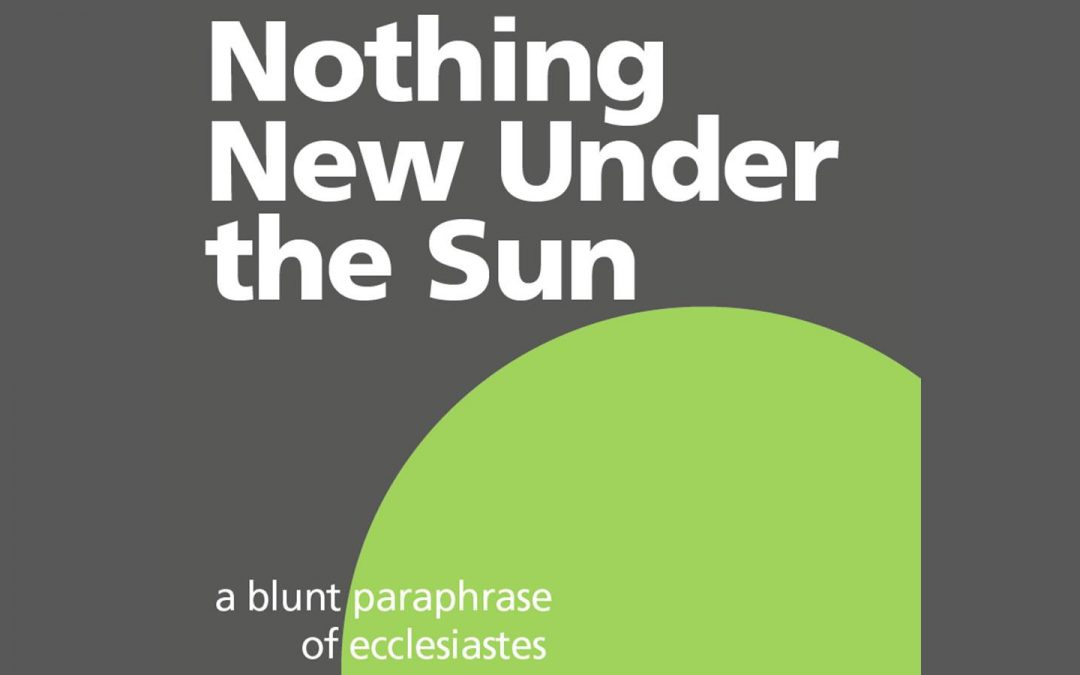Miller has done it again! The brain-crush for many LDS readers, Adam Miller, has given us another paraphrase of scripture he thinks we should be more familiar with. Last year it was Paul’s letter to the Romans and this time around it is Ecclesiastes.
This is a lovely rendition of Ecclesiastes for the modern reader, though I do wonder if ‘lovely’ should be associated with such bleakness. Ecclesiastes is the scripture, perhaps the only scripture in the Christian Canon, that illustrates feelings of despair and futility that life breathes. Some call it cynical, others consider it reality.
Here is a description of Ecclesiastes as “Existential Realism” that I find quite fitting:
Existential is used to describe man’s interaction with a world which feels foreign, cruel, and lonely. For the most part, it does not focus on anything outside of our immediate world and the emotions and passions we experience within it. My use of the word realism is meant to further emphasize this point. The dictionary definition of realism gives a nice summary: “the attitude or practice of accepting a situation as it is and being prepared to deal with it accordingly.”
In my opinion, this is exactly what Ecclesiastes aims to do. It is an observation of life after man was exiled from paradise — i.e. expelled from the Garden of Eden. Since the ‘fall of man,’ humanity has experienced a sense of alienation. Ecclesiastes captures this feeling beautifully.
Miller’s paraphrase of the ancient text makes the old words new and forcefully present to modern readers. It causes one to confront the realities of life. It forces one to drop the notion that if you ‘do good’ you will ‘get good’. That is painful for sure, we’d much rather find a salve to sooth the pain of life and tell us that all will be well in the end but Ecclesiastes offers no such relief. At times we benefit by taking a break from proverbial opiates we regularly imbibe about life being beautiful and it all our troubles being “worth it” in the end. Opening our eyes to pain and sorrow can make it so that we can REALLY feel alive and REALLY appreciate the times when life is truly beautiful.
Taking off the rose colored glasses can make us better. As Miller says, accepting life as it plainly is before us helps us “To be capable of love and not just obedience” and further it trains is so that “we [can] be capable of responding with grace to whatever is given.” When we live a ‘proverbs based life’ we come to expect good things to come our way, or if bad things come we expect only what we rightfully ‘deserve’ and no more. An ‘Ecclesiastical view’ places horror as the expectation and everything else that is not awful, as an undeserved bonus—a grace. In a strange turn the occasional tasting of despair can lead us to be more hopeful and optimistic, or at least more appreciative of what we do have.
My experience with another bleak text has shown, to me, that this is true. When I read Cormac McCarthy’s post-apocalyptic novel The Road, I felt a deep appreciation for the life I have (including canned food) and I had never wanted to hold my sons and my daughter more tightly than when I finished the last page. Ecclesiastes does not encourage us to stare into the abyss and despair, but it makes damned sure that we know the abyss is there. That knowledge may cause us to be a little bit better at seeing those right in front of us and appreciating their presence for the gift that it is.





If you think mortality is bleak and miserable, you're right. When we observe and accept conditions as they are, we still have to choose how to respond which depends on our world view. It becomes a self-fulfilling prophesy. I've always seen Miller as an optimist Paul, clearly, was not.